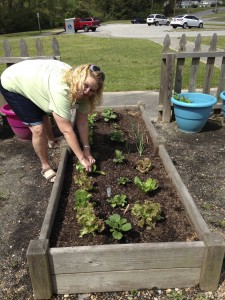So, when you are looking for garden seeds this spring, you can rest assured that whether you choose “organic”, “heirloom”, or hybrid seeds, there are no GM-seeds in your cart. If you are particularly concerned, remember that there are only nine commercially available GM-crops from seed - corn, soybeans, cotton, alfalfa, sugar beets, canola, papaya, squash and potato. So don’t get suckered in to paying extra for GM-free wheat seed or cucumber seeds – they are all non-GM.
The seed catalogs have started showing up in the mail and its time to plan the spring garden. If you are a gardener who strives to be socially responsible, you may be wondering where you can safely purchase seeds that are GMO-free. In fact, many small seed companies have signed a “safe seed pledge” stating that they do not knowingly buy, sell or trade genetically modified (GM) plants. This safe seed pledge raises a lot of questions, and implies that other seeds out there on the market are genetically modified but is this true?
First, lets talk a little bit about genetic modification or genetic engineering. Every food crop that we grow and eat has been modified from its original wild form. Humans have been saving seed and selecting for crop traits for thousands of years through plant breeding. Many of our crops bear little or no resemblance to their wild ancestors. The terms “genetically modified” (GM), “genetically modified organism” (GMO), genetically engineered or transgenic are typically applied to crops where the DNA has been modified through a specific process where several genes are added or removed. The genes that are added may be from a completely unrelated organism – this is a process that would be difficult if not impossible to achieve through regular plant breeding. Crops may be modified for a variety of reasons. Examples include: to make them more resistant to insects or diseases, more drought tolerant, resistant to certain herbicides, or improve storage quality. GM-crops must be tested to ensure that they are safe to eat and nutritionally similar to the non-GM version of that crop before they are allowed on the market. We aren’t going to get in to all the reasons that crops are genetically modified or debate whether or not crops should be genetically modified, but rather discuss when or if GMOs can make it in to your vegetable garden.
So where can you find genetically modified organisms? Well they are all over the grocery store, in your clothes and in the gasoline that you put in your car. In the United States, there are nine crops commercially available from GM-seed: corn, soybeans, cotton, alfalfa, sugar beets, canola, papaya, squash and potato. That’s it. A GM-apple has been approved and is coming to the market soon but isn’t available yet. A GM-tomato, the Flavr Savr tomato, was approved but was only marketed for three years and is no longer on the market. If you buy processed foods containing corn, sugar or soy, chances are good that you are buying GM-products unless the food is specifically labelled as organic or GMO-free. GM-corn is used in the production of ethanol, commonly added to gasoline. GM-cotton can be found in clothing and other fiber-products. GM-crops are frequently used in animal feed for the production of beef, pork, and chicken.
However, you are not likely to find GMOs in your home vegetable. For gardeners, there is no one selling genetically engineered seeds to home gardeners. Seed companies put a lot of money and effort in to producing their GM crops. When GM seeds are sold to commercial farmers, farmers are required to sign a contract that protects the company’s investment in their patented plant technology. These companies do not sell GM-crops to the home garden market or to garden centers. Even Monsanto’s subsidiary, Seminis, does not sell GM-seeds to the home garden market. I guess you might be able to pass yourself off as a farmer and access GM seeds that way but that would take some effort and ingenuity on your part. This means that the “safe seed pledge” is fairly meaningless. In fact, it is a marketing strategy designed to take advantage of consumers who do not know that GM-seeds are not freely available to the home gardener.
You certainly will find GM crops in the grocery store, gas station or clothing store, but you aren’t likely to find them in your vegetable garden.



